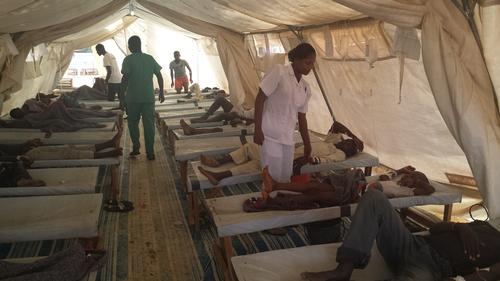The cholera outbreak which began in January in Bauchi State, northeastern Nigeria, is now over. More than 15,500 cases were reported and about 14 000 of those were treated by MSF teams in Bauchi.
Outbreak more significant than four years ago
14 of the 20 districts of Bauchi State were affected by the cholera outbreak, however, Bauchi district accounted for over 90 per centof all the cases reported (population of Bauchi district is nearly 608,000). Two weeks after the beginning of the outbreak, MSF decided to intervene , beginning with a cholera treatment unit (CTU)of 30 beds in Kandahar (asuburb of Bauchi town) then a 150 beds cholera treatment center (CTC) at the main teaching hospital of Bauchi Town.
"This outbreak is more significant than the one we faced four years ago in the same State. Number of cases is higher but fortunately the case fatality rate remained low at 0.5 per cent, bringing the number of deaths to 83 so far", said Dr Abubakr Bakri , head of mission in Abuja.
Preventive measures
Between 40 and 45 per cent of cases were severe, requiring hospitalization for intravenous rehydration. In total, MSF teams treated over 8,500 inpatients in the cholera treatment centers. 30 oral rehydration points were set up by MSF in the district to treat non-severe cases.
In this type of epidemic and especially in a country or a city where the population are in the hundreds of thousands, it is important to contain the outbreak through preventive measures such as targeted hygiene measures to avoid contamination (especially of drinking water). In Bauchi, water supply is mainly from either public or private wells.
Water chlorination
The logistics strategy deployed by MSF was very much needed and very important. "We sent out 15 teams to go around Bauchi district conducting bucket chlorination and targeted well chlorination. The strategy also involved health education and hygiene messages”. The chlorination of water sources campaign was accompanied by preventive hygiene, transportation of drinking water, and treatment of wastewater.
"This intervention was successfully conducted in close collaboration with Bauchi State Ministry of health and the State’s Primary Health Care Development Agency”, Dr Abubakr Bakri said.



